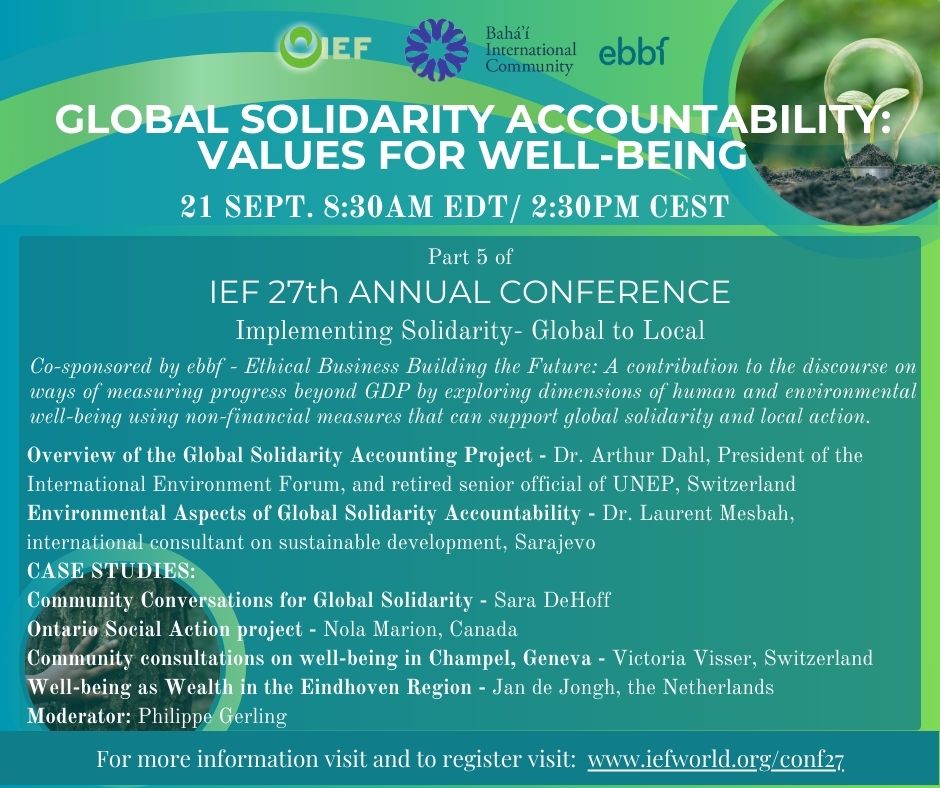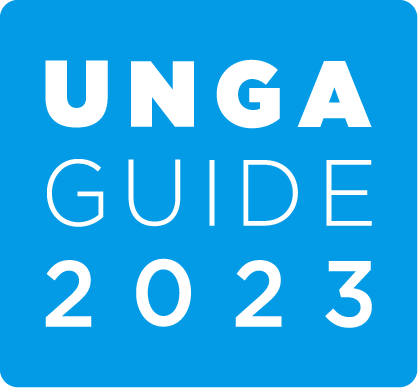
Global Solidarity Accountability: Values for Well-being

This event is part of the 27th Annual Conference of the International Environment Forum on the topic “Implementing Solidarity – Global to Local”.
As a contribution to the discourse on ways of measuring progress beyond GDP, ebbf-Ethical Business Building the Future and the International Environment Forum have led a project to explore dimensions of well-being that could be measured in non-financial ways. These include the environmental dimensions of energy and climate change, biodiversity, and pollution and waste; basic human needs to eliminate poverty, provide adequate food, and ensure good health; and social dimensions including work and service, knowledge and education, and ethical and spiritual values. The results can be useful both to contribute to the beyond GDP discourse at the UN Summit of the Future in 2024, and for community conversations to read the local reality and undertake social actions. This event will include a panel discussing lessons learned in the project, case studies of applications to discourse and social action in local communities, and open consultation on ways going forward.
TOPICS AND PANELISTS:
Overview of the Global Solidarity Accounting Project
Presented by Dr. Arthur Dahl, President of the International Environment Forum, and a retired senior official of UNEP, with extensive experience in the development of indicators of sustainability and values-based indicators. He originated the GSA project, and lives in Geneva, Switzerland.
The environment continues to degrade through failures in political will for implementation, requiring new approaches to accountability. There have been many calls for measures of progress beyond GDP, which measures the flow of money, profit and return on investment based on materialistic assumptions, not well-being, ethics, morality or spirituality, and thus encourages selfishness and greed. We need to value people and the planet, redefining notions of progress, civilisation and development. There are an increasing number of international and national efforts to develop indicators of well-being beyond GDP. IEF and ebbf have developed a new concept of global solidarity accounts relevant to human and natural well-being, using relevant science-based non-financial units of account. Nine initial indicator forms of capital are identified to respect both the planetary environmental boundaries of the global commons and the minimum social and economic standards for the common wellbeing of all humanity. These include:
– Environmental accounts: Carbon (energy), biodiversity, pollution
– Individual basic needs accounts(eliminating poverty) : minimum needs for shelter, security, water and sanitation, energy; food; health
– Social accounts: work/employment; knowledge and education; spiritual capital and values
This conceptual framework for human and environmental well-being can help individuals, communities, governments, businesses and other institutions, and global inequality. The approach scaled down to the community level can encourage conversations on global solidarity for sustainability, as the following case studies demonstrate.
Environmental Aspects of Global Solidarity Accountability
Presented by Dr. Laurent Mesbah, from Sarajevo, is an international consultant on sustainable development, teaches in various university programmes, and is a governing board member of the International Environment Forum.
Global human solidarity is very dependent on the planet on which we all live. We need to consider how resources and services provided by planet Earth with all its various ecosystems and diversity of life can serve all of humankind now and for generations to come.
CASE STUDIES:
– Community Conversations for Global Solidarity, USA
– Ontario Social Action project
– Community consultations on well-being in Champel, Geneva, Switzerland
– Well-being as Wealth in the Eindhoven Region. the Netherlands
